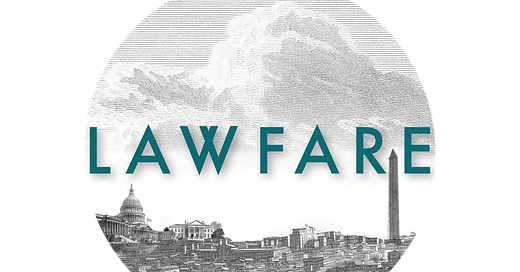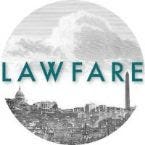Compiled by Maya Nicholson
Articles
Correcting Presidential Immunity’s Original Sin
Alan Z. Rozenshtein—in the context of upcoming oral argument before the Supreme Court regarding whether former President Donald Trump can be prosecuted for his attempt to subvert the results of the 2020 election—explained why the absolute immunity precedent established in Nixon v. Fitzgerald should not be extended to criminal cases. Rozenshtein argued that instead of absolute immunity, presidents should receive qualified immunity for official acts in both civil and criminal cases.
Fitzgerald is the law of presidential immunity’s original sin, albeit a fixable one. If presidents enjoyed only qualified immunity for official acts—at least for those acts falling outside a small core of powers that the Constitution vests solely in the president—not only would the doctrine of presidential civil immunity be more robust with respect to lawbreaking presidents, but it could also be applied straightforwardly to the criminal context in a way that would respect both what Fitzgerald characterized as the president’s “unique status under the Constitution” and then-judge Ketanji Brown Jackson’s admonition that “Presidents are not kings.”
Does a Civil Rights Law Prohibit Lies About Voting?
Quinta Jurecic discussed United States v. Mackey—a case concerning the user behind a pro-Trump Twitter page that spread disinformation to disenfranchise Hillary Clinton supporters in 2016—which is now on appeal. In light of recent oral argument before the Second Circuit, Jurecic examined the First Amendment implications of the case, the Justice Department’s decision to charge Mackey under a Reconstruction-era civil rights statute, and what the case means for the future of litigation concerning election disinformation.
The facts of Mackey’s case are, in some ways, a throwback—a reminder of a time when Donald Trump was still an insurgent, long-shot candidate, well before anyone imagined that Twitter might be purchased by Elon Musk. But United States v. Mackey has particular resonance right now in the months before the 2024 election. The chaotic 2016 vote directed a new political focus toward the risks posed by falsehoods circulating on social media. Four years later, Trump’s lies about the outcome of the 2020 election made those risks even more stark. Now, heading toward November 2024, the Second Circuit must consider to what extent existing criminal law provides the federal government with tools to counter certain forms of election lies, and how those tools can be squared with the protections of the First Amendment.
Podcasts
The Lawfare Podcast: Information Ecology and 19th Century Naturalism at Verify 2024: Benjamin Wittes sat down with Alicia Wanless and Chinmayi Sharma at Verify 2024—which brings together journalists and cyber and tech policy experts—to discuss critical issues in cybersecurity to talk about information ecology, 19th-century naturalism, and more.
Videos and Webinars
On April 11 at 4 p.m. ET, Jurecic will sit down with Roger Parloff and Anna Bower for this week’s episode of “Lawfare Live: Trump’s Trials and Tribulations.” Material supporters will receive a link to join the webinar and will be able to ask questions during the livestream. It will be livestreamed on YouTube for all other viewers. If you can’t attend the live event, the recording will be available immediately afterward on Lawfare’s YouTube channel or over the weekend on the Lawfare Podcast feed.
Announcements
On April 3, Lawfare announced another auction item on the Givebutter campaign— the “Black Hole of Awful” Post-It by Jurecic, one-of-a-kind Lawfare sketch born from a conversation with Wittes that illustrates the extent to which trial delay is advantageous to Trump. Other items of exclusive Lawfare merchandise up for auction include an autographed Lawfare jigsaw puzzle and Wittes’s Twitter sensation and protector of democracy #BabyCannon. Place your bids to support Lawfare’s Trump Trials coverage. You can also support Lawfare’s Trump Trials coverage by making a contribution here.
Support Lawfare
Follow us on Twitter, Facebook, YouTube, and LinkedIn. Become a material supporter on Patreon and Substack or make a one-time tax-deductible contribution on Givebutter. Sign up to receive Lawfare in your inbox. Check out relevant job openings on our Job Board.




